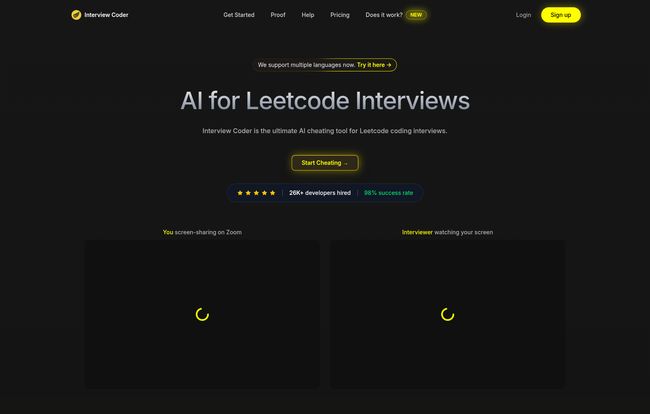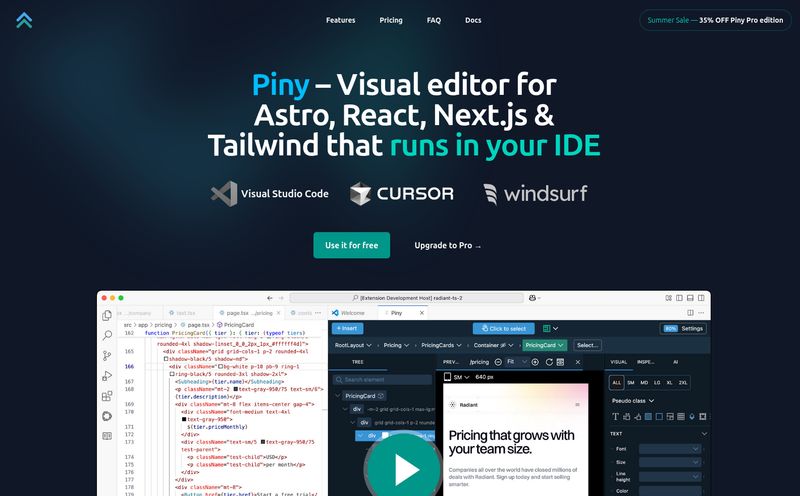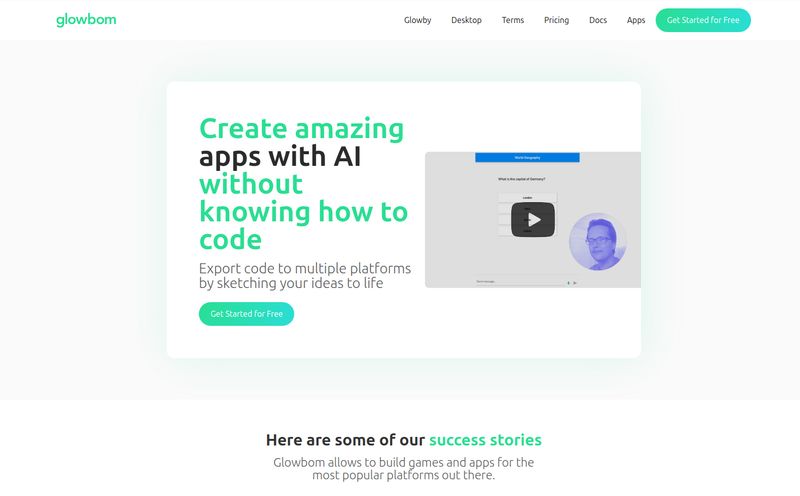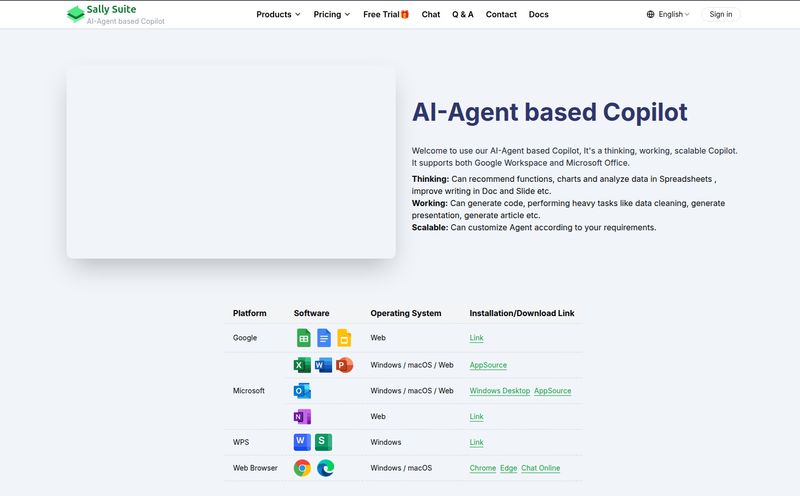The technical interview, especially the Leetcode-style live coding challenge, is a weird beast. It’s this high-pressure, artificial environment that’s supposed to gauge your ability to be a great software engineer. I’ve been in the tech and marketing space for years, and I’ve seen brilliant developers—people who can architect complex systems in their sleep—completely freeze up when asked to reverse a binary tree on a whiteboard (or, you know, a shared screen). It's a performance, not always a measure of skill.
So, when a tool like Interview Coder lands on my desk, I'm not immediately dismissive. I'm intrigued. On the surface, it’s an AI tool that gives you real-time answers and assistance during these interviews. Some people will scream “Cheating!” and, well, they’re not entirely wrong. But I think that’s a boring take. The more interesting question is, what does the existence of a tool like this say about the hiring process it’s designed to circumvent? And more importantly for you, does it actually work?
So, What is This Interview Coder Thing, Anyway?
Think of Interview Coder as your own personal Q, the gadget guy from James Bond, whispering answers in your ear during a high-stakes poker game. Except the game is a Zoom call with a senior engineer from a FAANG company, and the gadget is a slick desktop app. It's an AI-powered co-pilot designed specifically for the unique torture of Leetcode interviews.
You’re sharing your screen, you get a problem, your mind goes blank. Instead of panicking, you use a keyboard shortcut. The app takes a discreet screenshot of the problem, feeds it to its AI brain, and then overlays a solution right on your screen. An overlay that, crucially, the person on the other end of the call can't see. It's a ghost in the machine, writing the code with you. A wild concept, right?

Visit Interview Coder
The Features That Make It Tick
Your Secret AI Assistant
The core of the whole operation is its ability to generate solutions on the fly. You see the problem, you hit a command, and boom—you get code. But it's not just a block of text. The tool can provide explanations and even comment the code, giving you the talking points you need to walk the interviewer through your (or, ahem, the) logic. This is probably its biggest selling point—it doesn't just give you the fish, it gives you a quick lesson on how to pretend you caught it yourself.
The Cloak of Invisibility
This is where the magic, or the mischief, really happens. The main feature is its supposed undetectability during screen sharing. It works as an overlay that is filtered out by the video conferencing software's window capture function. So while you see the solution, the interviewer just sees your coding environment. It's a clever bit of engineering. The tool also claims to detect which tab is active, so it knows what problem to solve.
Keyboard Shortcuts for Speed and Stealth
When you're in a high-pressure interview, fumbling with a mouse to click on some app window is a dead giveaway. The creators obviously understood this. They've built in some simple, effective keyboard shortcuts. A quick Command + H takes a screenshot of the question, Command + Return generates the solution, and my personal favorite, Command + B, instantly hides and shows the app's window. It’s designed for stealthy operation under fire.
Let's Talk Ethics, Reality, and Leetcode
Okay, let's address it. Using this is, by definition, not playing by the rules. But I've always felt the rules of tech hiring are a bit… broken. Does solving an obscure algorithm problem in 20 minutes prove you'll be a good team member who writes clean, maintainable code and collaborates well? Not really. It proves you're good at Leetcode puzzles.
I see tools like Interview Coder as a market correction. It's a response to a flawed system. I'm not saying you should use this to lie your way into a job you're completely unqualified for. You'll be found out eventually. But if you're a capable developer who just sucks at the performance art of live coding, I can understand the appeal. It's a tool to get your foot in the door, to get you past the arbitrary gatekeepers so you can actually prove your worth on the job. It's a controversial stance, I know, but one that feels more pragmatic the longer you're in this industry.
Platform Compatibility: Does It Actually Work?
This is the million-dollar question. According to their site, the effectiveness varies. Here's a quick rundown:
- Hackerrank, Codesignal, CoderPad, Microsoft Teams, Google Meet: They list these as 'Undetectable'. This seems to be their bread and butter.
- Zoom: This one is 'Conditional'. You specifically need to use Zoom version 6.18 or older and mess with some advanced capture settings. This is a pretty big string to have attached, so definitely check your setup first.
- Chime: Also 'Conditional', and they note that the desktop app has limited compatibility.
They also throw in a warning that some macOS versions might have WebRTC issues that break the tool. The lesson here? Do your homework. Use the free trial and test it rigorously with your specific setup before you even think about using it in a real interview.
The Price of Admission: Interview Coder Pricing
So, what does this secret weapon cost? They have a few tiers, which I appreciate. You can dip your toes in before committing.
| Plan | Price | Best For |
|---|---|---|
| Interview Coder Free | $0 / month | Evaluating the features. Uses their 'Normal' AI models. A no-brainer to test it out. |
| Interview Coder Pro (Annual) | $25 / month (billed as $300 annually) | Serious job seekers. You get unlimited usage, debugging help, their 'most powerful' AI models, and support. |
| Interview Coder Pro (Monthly) | $60 / month | Short-term interview prep. The same Pro features but with the flexibility of a monthly subscription. |
The pricing seems fair for what it's promising. The annual plan offers a significant discount, but the $60 monthly option is perfect if you just have a few big interviews lined up. And a free tier is always a welcome sight, letting you verify its claims for yourself.
A Few Words of Caution
No tool is perfect. The reliance on specific Zoom versions is a bit of a red flag for me, as software updates could break functionality at any time. The potential for issues on macOS is also something to watch. Its a tool for a specific job, and its effectiveness relies on you passing what they call 'basic checks' before you even start. This isn't a magical silver bullet; it's a high-tech tool that requires a savvy operator. Don't go in blind.
Frequently Asked Questions About Interview Coder
Is Interview Coder free to use?
Yes, there is a free tier available. It's designed to let you evaluate the features and uses their standard AI models. For more powerful features and unlimited use, you'll need to upgrade to a Pro plan.
How is the tool actually undetectable?
It uses a screen overlay method. The application window is designed to be ignored by the screen capture technology used in most video conferencing and interview platforms. So, while you can see the AI's suggestions, your interviewer cannot.
What if I'm on a Mac? Are there any issues?
The developers themselves note that some versions of macOS may experience a WebRTC issue that can interfere with the tool's functionality. It's highly recommended to use the free trial to test it thoroughly on your machine before relying on it.
What happens if I find a bug or it doesn't work?
The Pro plans come with 24/7 customer support. For free users, there's likely a help center or community forum. Given the nature of the tool, I'd imagine the Pro support is the most reliable way to get issues resolved quickly.
What programming languages does it support?
The website states it supports multiple languages, which is typical for AI coding tools trained on large datasets like GitHub. You should confirm if it works well for your specific language of choice during the trial period.
Can it do more than just solve the problem?
Yes. A key feature is its ability to provide reasoning and comments for the code it generates. This helps you explain the solution to the interviewer, making your use of the tool less obvious and demonstrating a deeper understanding.
My Final Verdict on Interview Coder
So, where do I land on Interview Coder? It's a fascinating, powerful, and deeply controversial tool. It’s a direct product of a tech hiring culture that many, including myself, feel is overdue for a change. It's not for everyone, and it's certainly not without its risks—both technically and ethically.
However, for the developer who knows their stuff but crumbles under the pressure of a live coding quiz, this could be the very thing that levels the playing field. It's a digital crowbar to pry open a door that might otherwise be unfairly slammed shut. Just make sure you test it thoroughly, understand its limitations, and maybe, just maybe, use the time it saves you to actually become a better developer. That's a win in my book.



